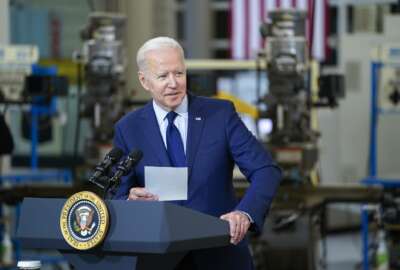 Exclusive
Exclusive NTEU President Tony Reardon retiring
In today's Federal Newscast: A union president, representing 150,000 federal workers, is hanging up the placards. The Army's first-ever civilian CIO has new pri...
- A longtime federal employee union leader is stepping down this summer. National Treasury Employees Union President Tony Reardon will retire in August, when delegates at the union’s National Convention will elect a new president. Reardon has worked more than 30 years at NTEU. Among the highlights of his tenure as president, he cites paid parental leave for federal employees, the expansion of telework and the $80 billion budgeted for the IRS over the next decade, as part of the Inflation Reduction Act.
- The Army wants $8 billion more in funding for fiscal 2024 than it asked for last year. The $185.5 billion request includes a 5.2% pay raise for military and civilian DoD employees and increases in housing and subsistence allowances for soldiers and their families. The Army plans to invest in upgrading industrial base facilities and building more barracks and family housing. Other priorities include funding programs for suicide prevention, recruiting, and preventing sexual harassment. The Army also plans to invest over $200 million, over the next several years, in child development facilities and youth centers.(Army Fiscal Year 2024 Budget Request Briefing - Defense Department)
- Raj Iyer, who until February was the Army's chief information officer, has found a new job as the new global head of public sector for ServiceNow, a position created for him. In the new role, Iyer will, among other things, oversee and integrate product development, marketing, sales, and government relations for global public sector clients. Iyer, who was the Army's first-ever civilian CIO, spent the last two years transforming the service's IT infrastructure and approach to managing technology and digital services.
- A double-digit increase in IT spending across federal civilian agencies is planned for 2024. Of the 25 CFO Act agencies, 19 would see huge IT budget increases in fiscal 2024. That list includes the departments of Veterans Affairs, Health and Human Services and Treasury, as well as EPA and SBA. The White House released new details of its 2024 budget request sent to Congress last week that outlines its $74 billion federal IT budget request. The budget request also includes $90 million for the Federal Citizen Services Fund at GSA and $14 million for the IT Oversight and Reform Fund managed by OMB. Last year, GSA requested $115 million and received $90 million from Congress in 2023. OMB asked for and received $14 million for the ITOR fund. (Celebrating 5 years of the Technology Modernization Fund - Federal News Network)
- The Biden administration outlines several federal hiring reforms in its fiscal 2024 budget request. The Biden administration is also looking to create 26 “talent teams” across the federal workforce. The teams would make skills-based assessments and pooled hiring actions a more common practice across federal hiring. The White House also proposes making a new hire at the Office of Personnel Management focused on career paths and development for federal HR professionals. HR personnel have a higher attrition rate compared to the rest of the federal workforce. The administration seeks that HR expertise as several agencies are looking at large-scale hiring efforts. (Biden plans federal pay compression fix, streamlined hiring in FY 24 budget - Federal News Network)
- Intelligence agencies are turning to Other Transaction Agreements (OTAs) to acquire new technologies. The Office of the Director of National Intelligence is preparing to delegate other transaction authority to civilian intel agencies like the CIA. OTAs fall outside normal acquisition rules and are seen as a flexible tool for prototyping. DoD’s use of OTAs has expanded significanly over the last seven years. The National Security Agency is using OTAs to test out different artificial intelligence use cases. (Intel agencies see ‘appealing’ use cases for OTAs - Federal News Network)
- The Defense Department is looking for a significant increase over last year's request in its intelligence budget. The details of that budget are classified, but the top-line number is $29.3 billion, up from the $26.6 billion requested last year. In 2022, the military intelligence program got $24 billion. Those figures include each of the military services and DoD's Special Operations Command.(Department of Defense Releases 2024 Military Intelligence Program Budget Request - Federal News Network)
- Agencies have a new tool to help evaluate the security of mobile applications. The Cybersecurity and Infrastructure Security Agency expanded access to the Mobile App Vetting service this month. The service evaluates potential security concerns with mobile applications being introduced to government-furnished smartphones. CISA said the vetting service has already helped U.S. Customs and Border Protection identify outdated and potentially risky software in a COVID-19 contact-tracing app. (Under the Promise of Early Success, CISA Expands its Beta Mobile App Vetting Service - Cybersecurity and Infrastructure Security Agency )
- The Office of Personnel Management is processing retirement claims faster than at any time over the last 16 months. New data from OPM shows, on average, it took 65 days to process federal retirees’ records in February. This is the least amount of time to process claims since October 2021. OPM received nearly 3,000 fewer claims last month compared to January, shrinking the backlog to 23,500. That’s the lowest it has been since December. The number of feds who retired in February, however, was the second highest amount over the last 10 months with more than 9,500.(Average time to process OPM retirement claims down by 30 days since October 2021 - Federal News Network)
- The White House has outlined a spending plan for the Office of Personnel Management to create a new health insurance marketplace for Postal Service employees. The Biden administration’s budget plan for fiscal 2024 would give OPM $28 million to create the Postal Service Health Benefits program within the Federal Employee Health Benefits program. It is a requirement in postal reform legislation signed into law last year. OPM must create the new postal health marketplace in time for an open enrollment period in late 2024. The program would begin operations in January 2025.
Copyright © 2024 Federal News Network. All rights reserved. This website is not intended for users located within the European Economic Area.
Peter Musurlian
Peter Musurlian is a producer at Federal News Network.
Follow @PMusurlianWFED





